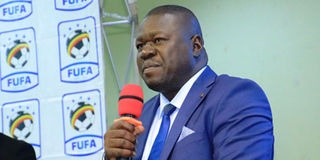Prime
NCS to pay financial reward for medals

NCS general secretary, Dr Bernard Patrick Ogwel
What you need to know:
National Council of Sports (NCS) is committing to rewarding athletes who win either Gold, Silver or Bronze and give Uganda mileage as billions of eyes watch on television in every corner of the world
The Uganda national anthem is played. The flag is raised. That’s the reward for becoming an Olympic champion. However, athletes don’t get paid for taking part in the Olympic Games, or winning.
Competing at these games is the most prestigious moment any sportsperson can live through, at par with the World Cup across the other sports disciplines.
National Council of Sports (NCS) is committing to rewarding athletes who win either Gold, Silver or Bronze and give Uganda mileage as billions of eyes watch on television in every corner of the world.
“There’s a financial reward but we don’t want people to think it’s about money,” the NCS general secretary, Dr Bernard Patrick Ogwel, said on phone from Tokyo, Japan yesterday.
“We will be able to reveal after. I can promise you that we have put money aside. It’s in the bank only waiting for withdrawal when the games are done,” he added.
Dr Ogwel said the rewards will also stretch to the paralympians games which start on August 24, just 16 days after the Olympics.
Reward and recognition scheme
This arrangement will again cast the light on the reward and recognition scheme for excelling athletes in this country.
Previously, it depended on President Museveni’s generosity, or mood.
From time to time, the President has given excelling sportsmen and women gifts that range from cars, houses and cash.
However, not all these have been delivered as is the case of middle distance legend Dorcus Inzikuru.
The 2005 world champion is still waiting for a car promised to her 16 years ago.
Currently, NCS and its mother ministry, Education and Sports, are working on a policy to guide the rewarding and recognition of excelling sportspersonalities.
With that process moving at tortoise pace, NCS has gone ahead to reward athletes with cash.
In 2018, the agency paid out Shs100m for medals won at the Commonwealth Games in Gold Coast Australia.
Shs50m reward
For his 5,000 and 10,000m double, Joshua Cheptegei pocketed Shs50m. Stella Chesang received Shs20m for winning the 10,000m women’s race.
Solomon Mutai, who won silver in the marathon, earned Shs15m while Mercyline Chelangat and Juma Miiro got Shs7.5m each for bronze in the 10,000m and boxing respectively.
NCS also gave paralympian David Emong Shs30m for his Gold at the 2017 World Para Athletics Championships in London.
While the International Olympic Committee (IOC) does not pay prize money to medalists, many countries offer monetary rewards to their athletes for the number of medals they win at the Olympics.
Shs2.7b for Gold
At the current Games, Singapore is paying the most for medals. Any Gold is worth $737,000 (Shs2.7b), $369,000 (Shs1.3b) for Silver and bronze comes with $184,000 (Shs680m) in prize money.
The prize money is taxable and awardees are required to return a portion of it to their national sports associations for future training and development.
The country sent only 23 athletes to Tokyo, two less than Uganda.
Singapore’s prize money is 20 times more than USA.
More than 600 US athletes are competing at the Tokyo Olympics, and the United States has so far won 13 gold, 13 silver and 10 bronze.
The US Olympic and Paralympic committee rewards athletes $37,500 (Shs138m) for every gold medal won, $22,500 (Shs83m) for silver and $15,000 (Shs55m) for bronze.
Most of the prize money is not taxable unless athletes report gross income that exceeds $1 million (Shs3.7b).
US athletes also receive other forms of support including health insurance, access to top-tier medical facilities and college tuition assistance for student athletes.
The sporting economy in the US allows athletes to better monetise their talents as most of it is driven by the private sector.
In countries such as Singapore, India and Uganda, many of the national sporting initiatives are driven by governments that sometimes use higher monetary rewards to encourage a growing sporting culture.




